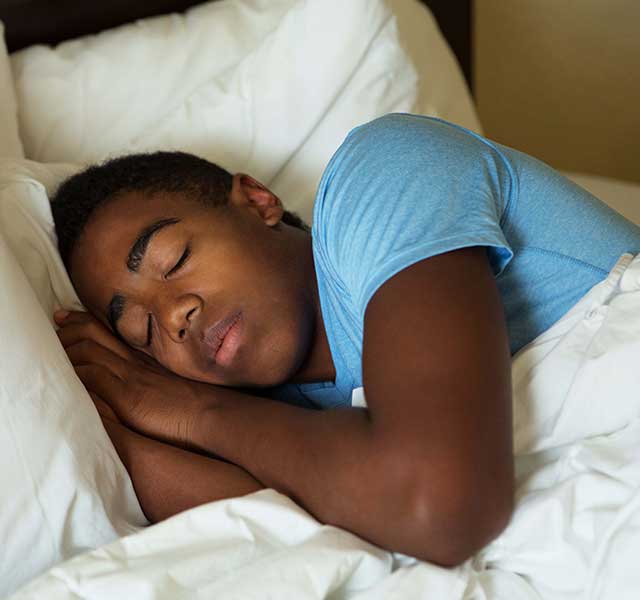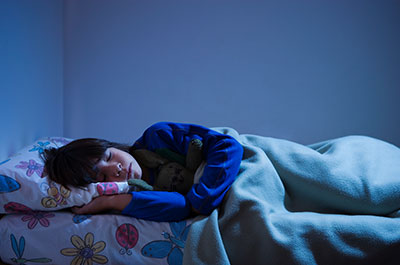Many athletes seem to believe time spent not training is time wasted. But the time athletes spend resting and sleeping is just as important. While sleeping, your body has time to recover, repair tissue damage and fight off infection. Information that was taken in during the day goes from your short-term memory to your long-term memory.
Athletes who are sleep deprived have worsened athletic performance, including slower reaction time and increased exhaustion. They are also at higher risk for injury and their injuries take longer to heal. They are also more likely to experience worsened mood – including depression.
“Teenagers need eight to ten hours of sleep per night for optimal performance and mental health,” says Virginia Skiba, M.D., a sleep medicine specialist at Henry Ford Health. “Unfortunately, up to 70% of students don’t get enough sleep. This is partly related to school schedules that require teenagers to wake up early. The circadian clock changes around puberty, so teenagers tend to go to sleep late and wake up late. Teenagers also don’t get sleepy as quickly as adults. In addition, many student athletes have demanding schedules, often forcing them to train and do their homework late. All these factors lead to insufficient sleep on school nights.”
Here, Dr. Skiba shares tips to help student athletes get quality sleep during their sports season:
1. Prioritize sleep.
Getting eight to ten hours of sleep may mean saying no to certain activities like hanging out with friends or getting in an extra workout.
2. Maintain a regular sleep schedule.
The body has an internal clock that is influenced by environment. Going to bed and waking up at approximately the same time each day can add a natural rhythm to the body’s internal clock, which can cause you to feel more awake during the day and fall asleep easily at night.
3. Bank your sleep.
If you have a late game or travel game coming up, you can “bank” your sleep – meaning you go to bed earlier or take a nap the day before.
4. Limit caffeine.
Caffeine is a popular ingredient in many pre-workout drinks, and many athletes use it for an energy boost. However, drinking caffeine late in the day may make falling asleep and staying asleep difficult.
5. Work out early.
Oftentimes, working out later in the day gives people a burst of energy that can keep them up late into the night. For example, exercising after 9 p.m. can boost body temperature, making sleep difficult. However, research shows morning workouts can help achieve deeper sleep, and working out in the afternoon can help reduce insomnia.

Struggling With Sleep?
6. Unplug.
Nothing can keep you up at night like a buzzing smartphone. Plus, the blue light from your phone may slow the production of melatonin, making sleep difficult. Limit exposure to bright lights within two hours of bedtime.
7. Practice relaxation techniques.
Engaging in a relaxation technique at bedtime - especially when your mind won’t shut off - can be quite helpful. Relaxation techniques include various breathing exercises and meditation. For example, try the 4-7-8 exercise, where you inhale through your nose for four seconds, hold your breath for seven and exhale for eight.
8. Keep it dark, cool and quiet.
Having the right environment is an important part of falling - and staying - asleep. Studies show that bedroom temperatures as low as 65 degrees can help you fall asleep.
“The American Academy of Sleep Medicine and the Michigan Academy of Sleep Medicine recommend that middle schools and high schools start no earlier than 8:30 am,” says Dr. Skiba. “Several states, including California and Florida, have made this shift. Most districts in Michigan still have early school start times, but more and more are making the change. I urge students and athletes to get involved in discussions with their districts to change school start times.
“Sleep is so vital to our health, performance and wellbeing, yet it is not viewed as a priority by many people, including student athletes. Once you make this mind shift, you will be able to maximize your true potential.”
Reviewed by Virginia Skiba, M.D., a sleep medicine specialist who sees patients at Henry Ford Medical Center - Grosse Pointe, Detroit and Sterling Heights.



